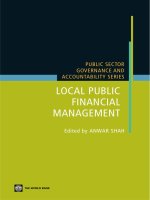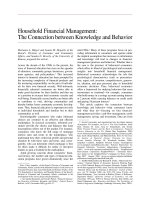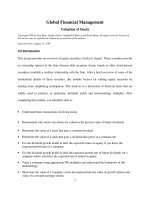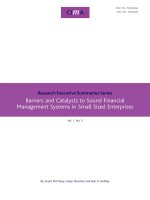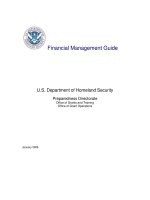Local Public Financial Management
Bạn đang xem bản rút gọn của tài liệu. Xem và tải ngay bản đầy đủ của tài liệu tại đây (1.3 MB, 290 trang )
PUBLIC SECTOR
GOVERNANCE AND
ACCOUNTABILITY SERIES
LOCAL PUBLIC
FINANCIAL
MANAGEMENT
Edited by ANWAR SHAH
LOCAL PUBLIC
FINANCIAL
MANAGEMENT
Introduction to the Public Sector Governance and Accountability Series
Anwar Shah, Series Editor
A well-functioning public sector that delivers quality public services consistent with citizen preferences and that fosters private market-led growth while managing fiscal resources prudently is
considered critical to the World Bank’s mission of poverty alleviation and the achievement of
the Millennium Development Goals. This important new series aims to advance those objectives by disseminating conceptual guidance and lessons from practices and by facilitating
learning from one another’s experiences on ideas and practices that promote responsive (by
matching public services with citizens’ preferences), responsible (through efficiency and equity
in service provision without undue fiscal and social risk), and accountable (to citizens for all
actions) public governance in developing countries.
This series represents a response to several independent evaluations in recent years that
have argued that development practitioners and policy makers dealing with public sector
reforms in developing countries and, indeed, anyone with a concern for effective public governance could benefit from a synthesis of newer perspectives on public sector reforms. This
series distills current wisdom and presents tools of analysis for improving the efficiency,
equity, and efficacy of the public sector. Leading public policy experts and practitioners have
contributed to this series.
The first 14 volumes in this series, listed below, are concerned with public sector
accountability for prudent fiscal management; efficiency, equity, and integrity in public service
provision; safeguards for the protection of the poor, women, minorities, and other disadvantaged groups; ways of strengthening institutional arrangements for voice, choice, and
exit; means of ensuring public financial accountability for integrity and results; methods of
evaluating public sector programs, fiscal federalism, and local finances; international practices
in local governance; and a framework for responsive and accountable governance.
Fiscal Management
Budgeting and Budgetary Institutions
Public Services Delivery
Local Budgeting
Public Expenditure Analysis
Local Public Financial Management
Local Governance in Industrial Countries
Performance Accountability and
Combating Corruption
Local Governance in Developing
Countries
Intergovernmental Fiscal Transfers:
Principles and Practice
Participatory Budgeting
Tools for Public Sector Evaluations
Macrofederalism and Local Finances
Citizen-Centered Governance
PUBLIC SECTOR
GOVERNANCE AND
ACCOUNTABILITY SERIES
LOCAL PUBLIC
FINANCIAL
MANAGEMENT
Edited by ANWAR SHAH
THE WORLD BANK
Washington, D.C.
©2007 The International Bank for Reconstruction and Development / The World Bank
1818 H Street, NW
Washington, DC 20433
Telephone: 202-473-1000
Internet: www.worldbank.org
E-mail:
All rights reserved
1 2 3 4 10 09 08 07
This volume is a product of the staff of the International Bank for Reconstruction and
Development / The World Bank. The findings, interpretations, and conclusions expressed
in this volume do not necessarily reflect the views of the Executive Directors of The World
Bank or the governments they represent.
The World Bank does not guarantee the accuracy of the data included in this work.
The boundaries, colors, denominations, and other information shown on any map in this
work do not imply any judgement on the part of The World Bank concerning the legal
status of any territory or the endorsement or acceptance of such boundaries.
Rights and Permissions
The material in this publication is copyrighted. Copying and/or transmitting portions or all
of this work without permission may be a violation of applicable law. The International
Bank for Reconstruction and Development / The World Bank encourages dissemination
of its work and will normally grant permission to reproduce portions of the work promptly.
For permission to photocopy or reprint any part of this work, please send a request
with complete information to the Copyright Clearance Center Inc., 222 Rosewood Drive,
Danvers, MA 01923, USA; telephone: 978-750-8400; fax: 978-750-4470; Internet:
www.copyright.com.
All other queries on rights and licenses, including subsidiary rights, should be
addressed to the Office of the Publisher, The World Bank, 1818 H Street, NW, Washington,
DC 20433, USA; fax: 202-522-2422; e-mail:
ISBN-10: 0-8213-6937-7
ISBN-13: 978-0-8213-6937-1
eISBN-10: 0-8213-6938-5
eISBN-13: 978-0-8213-6938-8
DOI: 10.1596/978-0-8213-6937-1
Library of Congress Cataloging-in-Publication Data
Local public financial management / edited by Anwar Shah.
p. cm.
Includes bibliographical references and index.
ISBN-13: 978-0-8213-6937-1
ISBN-10: 0-8213-6937-7
ISBN-10: 0-8213-6938-5 (electronic)
1. Local finance. 2. Finance, Public. I. Shah, Anwar.
HJ9105.L616 2007
355.4’215—dc22
2006101269
Contents
Foreword
Preface
xi
xiii
Acknowledgments
Contributors
xv
xvii
Abbreviations and Acronyms
Overview
xxi
1
Anwar Shah
CHAPTER
1
Financial Accounting and Reporting
7
Rowan Jones
Traditional Functions of Financial Accounting
and Reporting
9
Accounting Bases
13
Expanding Traditional Functions
19
Financial Reporting Standards
29
Summary
30
Notes
31
References and Other Resources
32
v
vi Contents
2
Local Government Cash Management
M. Corinne Larson
Collections
34
Funds Concentration
41
Disbursements
45
Banking Relationships
48
Cash Flow Forecasting
50
Investing
55
Conclusion
65
Notes
68
References and Other Resources
3
33
68
Local Government Procurement and Safeguards
69
against Corruption
Clifford P. McCue and Eric W. Prier
Overview of Public Procurement
70
Government Systems and the Potential for Corruption
at the Local Level
76
The Procurement Process as a Safeguard against Corruption
Ethics and Professionalism
97
Conclusion
101
Notes
103
References and Other Resources
103
4
Local Debt Management
79
109
Gerald J. Miller and W. Bartley Hildreth
How Do Local Governments Use Debt?
112
When Do Local Governments Use Debt?
116
How Do Local Governments Assess Debt Affordability?
121
What Forms of Debt Do Local Governments Use?
137
How Do Local Governments Issue Debt?
143
How Do Local Governments Manage Existing Debt?
149
Conclusion
151
References and Other Resources
152
Contents vii
5
Local Government Internal Controls to Ensure
157
Efficiency and Integrity
Jesse Hughes
Corruption and Money Laundering
157
Objectives and Scope of Internal Controls
159
COSO Framework on Risk Management
165
International Federation of Accountants Standards
Applicable to the Private and Public Sectors
171
Institute of Internal Auditors Standards Applicable to
the Private and Public Sectors
173
International Organization of Supreme Audit Institutions
Identification of Organization Need for Internal
Controls in the Public Sector
175
INTOSAI Framework
178
Public Internal Financial Control
180
Best Practices in Control and Management Systems for
European Union Membership (SIGMA Baselines)
181
Relevance and Feasibility of Internal Controls for Local
Governments in Developing Countries
181
Organizing to Implement Internal Controls
187
Notes
190
References and Other Resources
190
6
Internal Control and Audit at Local Levels
193
Mustafa Baltaci and Serdar Yilmaz
The Need for Improving Accountability in Decentralization
195
Contemporary Internal Controls
198
Internal Audit: A Key Module in Control Systems
204
Conclusion
208
Annex 6A.1: Internal Control and Audit in Local Governments
across the World
209
Annex 6A.2: Establishing Effective Internal Control in Local
Governments
212
Annex 6A.3: Starting from Scratch: Building an Audit Unit
in Local Government
216
Annex 6A.4: Basic Elements of Internal Audit
218
viii Contents
Annex 6A.5: Importance of Risk Management
Notes
222
References and Other Resources
223
7
221
External Auditing and Performance Evaluation, with
227
Special Emphasis on Detecting Corruption
Aad Bac
What Makes Auditing in the Government Area Special?
The Object of Audit
231
The Scope of the Audit
232
The Users of Audits
247
The Auditor
247
The Auditee
249
The Audit
250
The Auditor’s Reporting
253
References and Other Resources
254
Index
255
BOX
6.1
Three Types of Audit
206
FIGURES
1.1
1.2
1.3
1.4
1.5
1.6
1.7
2.1
2.2
4.1
Year-End Budget Report
12
Operating Statement under Cash Accounting
Based on Line Items
14
Statement of Payments under Cash Accounting Detailing
Operating and Capital Payments
15
Accrual-Based Statement of Financial Position
22
Accrual-Based Operating Statement
23
Accrual-Based Statement of Changes in Net Assets
24
Cash Flow Statement under the Direct Method
25
Cash Management Cycle
35
Account Structure and Flow of Funds
43
Matrix of Sources of Subnational Government Capital
Investment Financing
119
228
Contents ix
5.1
5.2
5.3
6.1
6.2
6.3
6.4
Risk Management Model
170
Framework for Establishing and Maintaining Effective
Internal Control
179
Recommended Organizational Structure for Implementing
Internal Controls
187
Internal Control Processes
200
Centralized Internal Control Model
202
Public Financial Management Cycle
204
Functional and Operational Links in Internal Control
and Audit
205
TABLES
2.1
2.2
3.1
4.1
4.2
4.3
4.4
4.5
4.6
4.7
6.1
6.2
Cash Flow Forecast
54
Sample Portfolio Holdings Report
66
Components of Procurement Planning
81
Leading Practices in Capital Decision Making
113
Sample Policies for Capital Improvement Programming
115
Sources of Capital Investment Financing for a
Capital Budget
117
Subnational Borrowing Controls across the World
124
States and National Association of State Budget Officers
(NASBO)––Classified Policies Limiting Debt Service
and Debt
126
State Debt Affordability Study––Recommended Ratios for
Measuring and Monitoring Debt Capacity
130
Targets and Ceilings
131
Local Governments and Internal Controls in Selected
Countries
196
Evolution of Internal Audit
207
Foreword
In Western democracies, systems of checks and balances built into
government structures have formed the core of good governance
and have helped empower citizens for more than two hundred years.
The incentives that motivate public servants and policy makers—
the rewards and sanctions linked to results that help shape public
sector performance—are rooted in a country’s accountability
frameworks. Sound public sector management and government
spending help determine the course of economic development and
social equity, especially for the poor and other disadvantaged
groups, such as women and the elderly.
Many developing countries, however, continue to suffer from
unsatisfactory and often dysfunctional governance systems that
include rent seeking and malfeasance, inappropriate allocation of
resources, inefficient revenue systems, and weak delivery of vital
public services. Such poor governance leads to unwelcome outcomes for access to public services by the poor and other disadvantaged members of society, such as women, children, and
minorities. In dealing with these concerns, the development assistance community in general and the World Bank in particular are
continuously striving to learn lessons from practices around the
world to achieve a better understanding of what works and what
does not work in improving public sector governance, especially
with respect to combating corruption and making services work for
poor people.
The Public Sector Governance and Accountability Series
advances our knowledge by providing tools and lessons from practices
in improving efficiency and equity of public services provision and
strengthening institutions of accountability in governance. The series
xi
xii Foreword
highlights frameworks to create incentive environments and pressures for
good governance from within and beyond governments. It outlines institutional mechanisms to empower citizens to demand accountability for results
from their governments. It provides practical guidance on managing for
results and prudent fiscal management. It outlines approaches to dealing
with corruption and malfeasance. It provides conceptual and practical guidance on alternative service delivery frameworks for extending the reach and
access of public services. The series also covers safeguards for the protection
of the poor, women, minorities, and other disadvantaged groups; ways of
strengthening institutional arrangements for voice and exit; methods of
evaluating public sector programs; frameworks for responsive and accountable governance; and fiscal federalism and local governance.
This series will be of interest to public officials, development practitioners, students of development, and those interested in public governance
in developing countries.
Frannie A. Léautier
Vice President
World Bank Institute
Preface
The practice of public financial management is now considered
critical in combating corruption, alleviating poverty, and ensuring
the effective use of internal and external resources. This volume
aims to bring guidance on better practices in public financial management to the attention of policy makers and practitioners in
developing countries with a view to reforming existing systems.
The volume provides an overview of local government financial
accounting and reporting. Better practices in cash management are
documented. The use of transparent procurement processes to mitigate corruption is elaborated. Practical guidance is imparted on how
and when to use debt, how to assess debt affordability, what debt to
use, how to issue debt, and how to manage debt. The use of internal
controls and audits to ensure efficiency and integrity is highlighted.
The role of external audit in combating corruption is also discussed,
and audit methods to detect corruption are presented.
The volume represents a collaborative effort of the Swedish
International Development Cooperation Agency and the World Bank
Institute to support reform of the public expenditure management
and financial accountability systems in developing countries, especially in Africa. We hope policy makers and practitioners will find this
volume to be a useful tool in guiding their reform efforts.
Roumeen Islam
Manager, Poverty Reduction and Economic Management
World Bank Institute
xiii
Acknowledgments
This book brings together learning modules on local financial
management prepared for the World Bank Institute learning programs over the past three years. These learning modules and their
publication in the current volume were primarily financed by the
government of Sweden through its Public Expenditure and Financial
Accountability (PEFA) partnership program with the World Bank
Institute, directed by the editor. The government of Japan provided
additional financial support for the editing of this volume. The editor
is grateful to Hallgerd Dryssen, Swedish International Development
Cooperation Agency, Stockholm, for providing overall guidance and
support to the PEFA program. In addition, Bengt Anderson, Goran
Anderson, Gunilla Bruun, Alan Gustafsson, and other members of
the PEFA external advisory group contributed to the design and
development of the program.
The book has benefited from contributions to World Bank
Institute learning events by senior policy makers and scholars from
Africa and elsewhere. In particular, thanks are due to Tania Ajam,
director, Applied Fiscal Research Center, South Africa; Paul Boothe,
former associate deputy minister, Ministry of Finance, Canada; Neil
Cole, director, South Africa National Treasury; Anders Haglund,
PricewaterhouseCoopers, Stockholm; Roy Kelly, professor, Duke
University; Florence Kuteesa, public finance consultant, Ministry of
Finance, Uganda; John Mikesell, professor, Indiana University;
Ismail Momoniat, director general, South Africa National Treasury;
and Christina Nomdo, Institute for Democracy in South Africa,
Cape Town.
The editor is grateful to the leading scholars who contributed
chapters and to the distinguished reviewers who provided comments.
xv
xvi Acknowledgments
Anupam Das, Alta Fölscher, Adrian Shall, and Chunli Shen helped during
various stages of preparation of this book and provided comments and editorial revisions of individual chapters. Kaitlin Tierney provided excellent
administrative support for this project.
The editor is also grateful to Stephen McGroarty for ensuring a fasttrack process for publication of this book and to Dina Towbin for excellent
editing supervision. Denise Bergeron is to be thanked for the excellent print
quality of this book.
Contributors
AAD BAC is full professor of accountancy, especially government
accountancy, at Tilburg University in the Netherlands, where he is
chair of the School of Accountancy. Since 1993, he has also been a
visiting professor at the University of the Dutch Antilles at Curaỗao.
He combined his academic career with practice from 1974 until
2001 as a partner of Deloitte and its legal predecessors. In his practice
as well as in his academic endeavors, he has specialized in financial
reporting, financial management, administrative organization, and
information systems (as an adviser), and auditing (as a practicing
auditor) in the public sector. He has published papers, articles, and
books, and lectured at a number of other universities and in other
countries on these topics.
is deputy director of the Prime Minister’s Inspection Board in Turkey. He was with the World Bank as a research
analyst in 2005 working on public financial management, accountability, fiscal decentralization, internal control, and audit. He holds
a master’s degree in government administration and a diploma in
public finance from the University of Pennsylvania.
MUSTAFA BALTACI
W. BARTLEY HILDRETH is the Regents Distinguished Professor of Public
Finance and director of the Kansas Public Finance Center in the
Hugo Wall School of Urban and Public Affairs and the W. Frank
Barton School of Business at Wichita State University. During fall
2005, he served as the Fulbright visiting research scholar in public
policy at McGill University in Montreal.
xvii
xviii Contributors
DR. JESSE HUGHES
has during the past 10 years, conducted research for the
International Federation of Accountants and consulted on governmental
financial management issues in many countries, including Armenia, Azerbaijan, Bosnia and Herzegovina, Macedonia, Malawi, Moldova, Nigeria, the
Syrian Arab Republic, and Zambia. He taught accounting and financial
management for 20 years at Hampton University, Hampton, Virginia,
and Old Dominion University, Norfolk, Virginia, where he is professor
emeritus of accounting. Before teaching, he worked for 20 years at the
federal level as an auditor, management analyst, systems analyst, chief
accountant, and comptroller. He is editor of the Public Fund Digest for the
International Consortium of Government Financial Managers and is a
member of its board.
is professor of public sector accounting, University of
Birmingham, United Kingdom. He is coauthor (with M. W. Pendlebury)
of Public Sector Accounting (5th edition, 2000) and coeditor (with K. Lüder) of
Reforming Governmental Accounting and Budgeting in Europe (2003;
Chinese translation, 2005).
ROWAN JONES
M. CORINNE LARSON joined the MBIA Asset Management Group in July 1999.
She is responsible for managing the marketing and client service functions
for the firm’s third-party accounts as well as for providing technical and
educational services in cash management. She formerly served as assistant
director in the research center of the Government Finance Officers Association (GFOA), where she was responsible for managing the association’s cash
management programs. She is a frequent speaker on cash management and
investment topics and is the author of numerous publications, including
Investing Public Funds (2nd edition). She served for seven years as the editor of Public Investor, GFOA’s monthly investment newsletter, and sits on
GFOA’s Standing Committee on Retirement and Benefits Administration.
In addition, She has more than 10 years’ experience in corporate treasury
management. She holds the designation of Certified Treasury Professional
through the Association for Financial Professionals and sits on the association’s
Editorial Advisory Board for its professional journal, AFP Exchange. She
received her bachelor of arts from Indiana University, South Bend, and her
master of business administration from the University of Notre Dame, Indiana.
CLIFFORD P. MCCUE is an associate professor at the School of Public Administration, Florida Atlantic University, Boca Raton. His teaching and research
interests are in public administration, public procurement, and public policy.

